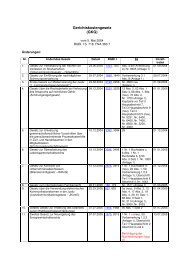Netherlands National Drug Monitor - Research and Documentation ...
Netherlands National Drug Monitor - Research and Documentation ...
Netherlands National Drug Monitor - Research and Documentation ...
Create successful ePaper yourself
Turn your PDF publications into a flip-book with our unique Google optimized e-Paper software.
performance of these tasks remained more or less unchanged, with the exception<br />
of a negative effect on verbal memory.<br />
- Indications of possible damage to nerve endings were also found, as well as an<br />
increased need for sensation seeking. No effect on depression or impulsiveness was<br />
found.<br />
- It is not known whether the artery narrowing <strong>and</strong> memory reduction is permanent.<br />
The clinical relevance of these effects would appear to be small, for the time being<br />
at least.<br />
• <strong>Research</strong> conducted among rather older Ecstasy users (40-45 years) shows that the<br />
negative effects of Ecstasy on verbal memory exacerbate the normal age-related<br />
deterioration of the brain (Schilt, 2009). It is not known whether at a later age (65+),<br />
Ecstasy will accelerate the process of cognitive decline.<br />
• There may possibly be a degree of genetic susceptibility to the effects of Ecstasy on<br />
verbal memory (Schilt, 2009).<br />
Combined use of Ecstasy (MDMA) <strong>and</strong> other substances may incur (acute) risks.<br />
• Lab research conducted by the University of Leiden found that both MDMA <strong>and</strong> THC<br />
(the main active component of cannabis) cause a faster heartbeat. The effects can be<br />
amplified if these two substances are taken simultaneously. Furthermore, the elevated<br />
body temperature caused by MDMA use lasts longer if THC is also ingested (Dumont,<br />
2009). An accelerated heartbeat can lead to health problems in certain individuals.<br />
• Remarkably, the consumption of a low dose of alcohol (2-3 units) appears to have a<br />
somewhat mitigating influence on certain physiological effects of MDMA, such as fluid<br />
retention <strong>and</strong> raised body temperature. It is not known whether these findings may<br />
have practical relevance. Higher doses of alcohol could have the opposite effect.<br />
• A comprehensive meta-analysis of human research does indeed suggest a certain<br />
protective effect of alcohol on the harmful consequences of Ecstasy use. The study<br />
puts forward two possible explanations for this. It may be that alcohol suppresses the<br />
harmful effects on the brain of overheating from Ecstasy use. Alternatively, Ecstasy<br />
users who simultaneously consume alcohol may tend to be more moderate users of<br />
the drug (Rogers, 2009).<br />
Deaths<br />
The exact number of deaths due to use of amphetamine <strong>and</strong> Ecstasy is unknown.<br />
• According to the cause of death statistics of Statistics <strong>Netherl<strong>and</strong>s</strong> (CBS), these<br />
substances are not often the primary cause of death. In the period 1996 - 2002<br />
there was a maximum of four acute deaths per year. In 2003 Statistics <strong>Netherl<strong>and</strong>s</strong><br />
registered seven cases, in 2004 five cases <strong>and</strong> both in 2005 <strong>and</strong> 2006 four cases.<br />
In 2007 only one case was registered <strong>and</strong> in 2008 only two (ICD-10 code F15 <strong>and</strong><br />
ICD-10 codes X41, X61 <strong>and</strong> Y11, all three codes in combination with code T43.6;<br />
for an explanation of the codes, see appendix C). These codes not only refer to<br />
amphetamines <strong>and</strong> MDMA (-like substances), but also to other stimulants such as<br />
caffeine, ephedrine <strong>and</strong> khat.<br />
5 Ecstasy, amphetamine <strong>and</strong> related substances<br />
125




